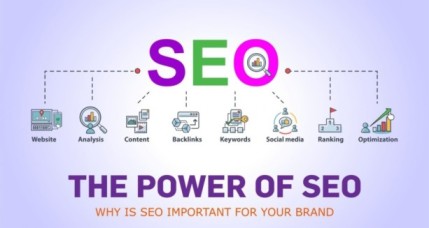Search Engine Optimization (SEO) is the practice of optimizing a website or online content to improve its visibility and ranking on search engine results pages (SERPs).Why is SEO Important? Understanding SEO is essential for anyone looking to increase organic traffic, enhance online presence, and achieve better visibility for their website. This article will cover the basics of SEO, including its importance, key components, best practices, and tools to help you get started.
Why is SEO Important?
- Increased Visibility:
- Credibility and Trust:
- Websites that rank higher are often perceived as more credible and trustworthy by users. Good SEO practices can enhance your brand’s reputation.
- Cost-Effectiveness:
- Compared to paid advertising, SEO is a more cost-effective long-term strategy. While it may require initial investment in terms of time and resources, organic traffic does not incur ongoing costs.
- User Experience:
- Many SEO strategies focus on improving user experience, such as website speed, mobile-friendliness, and content quality. A better user experience can lead to higher engagement and conversions.
- Long-Term Results:
- While results may take time to manifest, effective SEO strategies can provide sustainable long-term benefits, maintaining traffic and visibility over time.
Key Components of SEO
- On-Page SEO:
- On-page SEO involves optimizing individual web pages to rank higher and earn more relevant traffic. Key elements include:
- Keyword Research: Identifying the terms and phrases your target audience uses when searching for information.
- Content Quality: Creating high-quality, valuable, and relevant content that meets users’ needs and addresses their queries.
- Title Tags and Meta Descriptions: Writing compelling title tags and meta descriptions that accurately describe the page’s content and encourage clicks.
- Header Tags: Using header tags (H1, H2, H3) to structure content, making it easier for both users and search engines to understand the hierarchy of information.
- URL Structure: Creating clean and descriptive URLs that reflect the content of the page.
- Off-Page SEO:
- Off-page SEO refers to actions taken outside of your own website to impact your rankings. This includes:
- Backlinking: Acquiring backlinks from reputable websites to improve domain authority and credibility. Quality matters more than quantity; focus on links from relevant and authoritative sources.
- Social Media Engagement: Promoting your content on social media platforms to drive traffic and increase visibility.
- Influencer Outreach: Collaborating with influencers or industry leaders to increase brand awareness and reach a larger audience.
- Technical SEO:
- Technical SEO involves optimizing the backend of your website to improve its performance and accessibility. Key aspects include:
- Site Speed: Ensuring fast loading times to enhance user experience and reduce bounce rates.
- Mobile-Friendliness: Ensuring your website is responsive and provides a good experience on mobile devices.
- XML Sitemaps: Creating and submitting an XML sitemap to search engines to help them crawl and index your site more effectively.
- Robots.txt: Utilizing a robots.txt file to control which parts of your site search engines can crawl.
- Structured Data: Implementing structured data (schema markup) to help search engines understand your content better and enhance the appearance of your site in search results.
SEO Best Practices
- Conduct Keyword Research:
- Create High-Quality Content:
- Focus on producing valuable, informative, and engaging content that addresses users’ queries and needs. Aim for in-depth articles, how-to guides, and valuable resources.
- Optimize for Mobile:
- Ensure your website is responsive and performs well on mobile devices, as a significant portion of web traffic comes from mobile users.
- Monitor and Analyze Performance:
- Use tools like Google Analytics and Google Search Console to track website performance, user behavior, and keyword rankings. Regularly analyze data to identify areas for improvement.
- Stay Updated with SEO Trends:
- SEO is constantly evolving, so it’s crucial to stay informed about the latest trends, algorithm updates, and best practices.
Tools for SEO
- Google Analytics:
- A powerful tool for tracking website traffic, user behavior, and conversion metrics.
- Google Search Console:
- Helps monitor and troubleshoot your website’s presence in Google search results, providing insights into indexing, search performance, and crawl issues.
- SEMrush:
- An all-in-one marketing toolkit that offers keyword research, site audits, backlink analysis, and competitive analysis.
- Ahrefs:
- A comprehensive SEO toolset that provides insights into backlink profiles, keyword rankings, and content analysis.

- Yoast SEO:
- A popular WordPress plugin that helps optimize on-page SEO by providing suggestions for improving content, meta tags, and overall site performance.
Conclusion
Understanding the basics of SEO is essential for anyone looking to improve their website’s visibility and attract organic traffic. By focusing on key components such as on-page SEO, off-page SEO, and technical SEO, you can create a comprehensive strategy that enhances your online presence. With continuous learning, monitoring, and adapting to trends, effective SEO practices can lead to sustainable growth and success in the digital landscape. Whether you’re a business owner, blogger, or digital marketer, investing time and effort into SEO will pay off in the long run.
